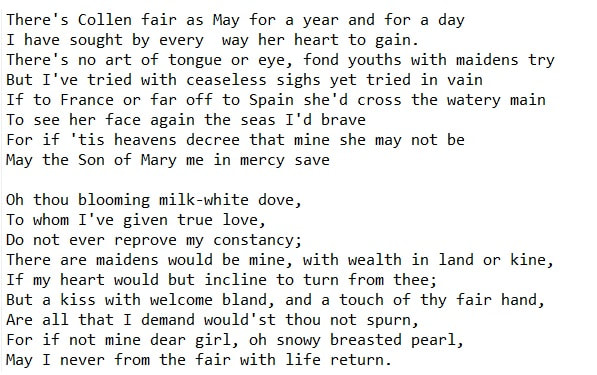Snowy Breasted Pearl Irish Song Lyrics And Chords
Written by George Petrie. Recorded by Paddy Reilly , The Wolfe Tones , John McCormack to name a few , The song dates back to 1855. The Wolfe Tones play this old folk song in the key of C#. And here's the sheet music for snowy breasted pearl which is a lovely tune to play on the tin whistle.
Snowy Breasted Pearl Song Words And Chords In C Major
There's[C] Collen[Am] fair as[C] May for a year and for a [G7]day
I have[C] sought by eve[Am]ry[F] way her[G7] heart to [C]gain.
[C]There's no art of[Am] tongue or[C] eye, fond youths with maidens[G7] try
But I've[C] tried with[Am] ceaseless[F] sighs[G7] yet tried in[C] vain
If to[C] France or[Am] far off to[Em] Spain she'd[G] cross the watery[Em] main
To[F] see her face[D7] again the seas I'd[G7] brave
For if 'tis[C] heavens[Am] decre[C]e that mine she may notG7] be
May the[C] Son of[Am] Mary[F] me in[G7] mercy[C] save
Oh thou blooming milk-white dove,
To whom I've given true love,
Do not ever reprove my constancy;
There are maidens would be mine, with wealth in land or kine,
If my heart would but incline to turn from thee;
But a kiss with welcome bland, and a touch of thy fair hand,
Are all that I demand would'st thou not spurn,
For if not mine dear girl, oh snowy breasted pearl,
May I never from the fair with life return.
There's[C] Collen[Am] fair as[C] May for a year and for a [G7]day
I have[C] sought by eve[Am]ry[F] way her[G7] heart to [C]gain.
[C]There's no art of[Am] tongue or[C] eye, fond youths with maidens[G7] try
But I've[C] tried with[Am] ceaseless[F] sighs[G7] yet tried in[C] vain
If to[C] France or[Am] far off to[Em] Spain she'd[G] cross the watery[Em] main
To[F] see her face[D7] again the seas I'd[G7] brave
For if 'tis[C] heavens[Am] decre[C]e that mine she may notG7] be
May the[C] Son of[Am] Mary[F] me in[G7] mercy[C] save
Oh thou blooming milk-white dove,
To whom I've given true love,
Do not ever reprove my constancy;
There are maidens would be mine, with wealth in land or kine,
If my heart would but incline to turn from thee;
But a kiss with welcome bland, and a touch of thy fair hand,
Are all that I demand would'st thou not spurn,
For if not mine dear girl, oh snowy breasted pearl,
May I never from the fair with life return.
Snowy Breasted Pearl Lyrics And Guitar Chords In G
There's[G] Collen[Em] fair as[G] May for a year and for a [D7]day
I have[G] sought by eve[Em]ry[C] way her[D7] heart to [G]gain.
[G]There's no art of[Em] tongue or[G] eye, fond youths with maidens[D7] try
But I've[G] tried with[Em] ceaseless[C] sighs[D7] yet tried in[G] vain
If to[G] France or[Em] far off to[Bm] Spain she'd[D] cross the watery[Bm] main
To[C] see her face[A7] again the seas I'd[D7] brave
For if 'tis[G] heavens[Em] decre[G]e that mine she may not[D7] be
May the[G] Son of[Em] Mary[C] me in[D7] mercy[G] save
There's[G] Collen[Em] fair as[G] May for a year and for a [D7]day
I have[G] sought by eve[Em]ry[C] way her[D7] heart to [G]gain.
[G]There's no art of[Em] tongue or[G] eye, fond youths with maidens[D7] try
But I've[G] tried with[Em] ceaseless[C] sighs[D7] yet tried in[G] vain
If to[G] France or[Em] far off to[Bm] Spain she'd[D] cross the watery[Bm] main
To[C] see her face[A7] again the seas I'd[D7] brave
For if 'tis[G] heavens[Em] decre[G]e that mine she may not[D7] be
May the[G] Son of[Em] Mary[C] me in[D7] mercy[G] save


